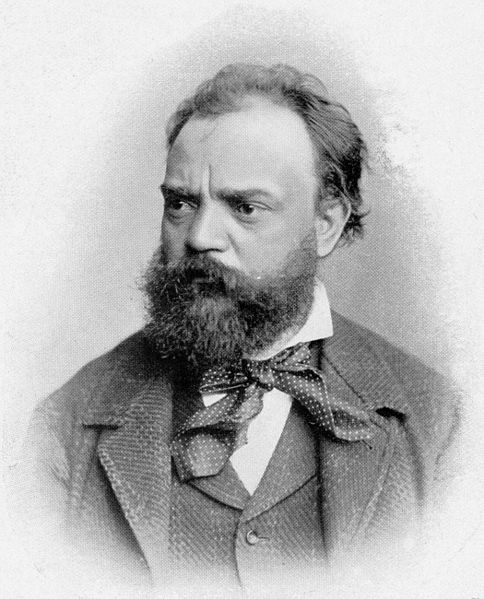
Antonin Dvořák
The Nineteenth Century saw the rise of nationalist movements across Europe, efforts by countries to establish political, cultural, and artistic independence. These movements were, especially strong in small nations long dominated by the Hapsburgs or the Russian tsars. One milestone in this struggle came in the form of nationalist composers who began to achieve a distinct musical voice, particularly in the composition of new operas and bold orchestral music.
We can view much of Dvořák’s musical career through this lens, particularly as he chose to remain in his homeland and cultivate Czech literature, tradition, and legends in his music. Yet, he did achieve international fame, even while remaining committed to promoting the music of his homeland.
Antonin Dvořák grew up on the Moldau (Vltava), a major symbol of Czech culture and the country’s longest and most important river. His father, a butcher, ran a local inn in the small town of Nelahozeves 20 miles north of Prague. And while his father played the zither and supported the idea of young Antonin learning violin and playing at the inn and in the local church, he was not enthusiastic about his son becoming a professional musician.
So, Dvořák was apprenticed as a butcher, but then left town for nearby Zlonice where he could learn from the local church organist and German teacher who eventually convinced Dvořák’s father to allow the boy to attempt a career in music. Dvořák entered the Prague Organ School in 1857 and, while there, played the viola in opera productions at the Estates Theater—the same 18th-century theater where Mozart conducted the premiere of Don Giovanni. After his graduation in 1859, Dvořák was employed in a band that played at restaurants and weddings. Later, the band became part of an orchestra for the Provisional Theater that was particularly interested in promoting Czech music. The famed Czech composer Bedřich Smetana would become its conductor in 1866.
Dvořák’s early compositions from this period include two symphonies, a cello concerto, and a song cycle. He wrote two operas in 1870 and 1871. In 1873, he was hired by a wealthy family to accompany their singing and teach piano to their children. This eased his financial situation somewhat. He married in 1873 and was appointed organist at St. Adalbert’s in Prague.
In 1874, Dvořák applied for the Austrian State Stipendium established for needy artists. The judges included the critic Eduard Hanslick and composer Johannes Brahms. Dvořák received an award in 1874 and won the full prize in 1876 and 1877. Brahms was impressed by Dvořák’s music and, in a most helpful gesture, arranged for his own publisher Simrock to publish Dvořák’s Slavonic Dances. These piano duets were favorably reviewed and helped Dvořák gain the notice of the musical world beyond Prague.

Personal Data
Dates: 1841-1904
Born: Nelahozeves, Austrian Empire
(now Czech Republic)
Residence: Prague
Friday Performance Picks: Works by Dvořák
No. 30 Dvořák: Nocturne in B Major, Op. 40
No 47: Slavonic Dance, Op. 72, No. 2
No. 128: String Quintet in G Major, Op. 77
No. 301: Serenade for Winds, Op. 44

Timeline
Early Works
Slavonic Dance, Op. 46, No. 8 (1878)
The Slavonic Dances represent Dvořák’s first real success. The set consists of 8 dances for piano four-hands (duet). In the wake of their publication and enthusiastic reception, Dvořák’s works began to receive performances throughout Europe.
Dvořák orchestrated this set of dances soon after their publication and composed another collection of 8 Slavonic Dances in 1886 (Op. 72).
This performance features the Canadian pianist Jan Lisiecki and violinist James Ehnes. Ehnes was featured in a Performance Pick of Paganini’s Caprice No. 24 in A minor. It’s not clear from the video, but the page-turner is Peter Oundjian, then music director of the Toronto Symphony Orchestra.
(You must be logged into the Circle of Scholars to view the rest of this page.)
